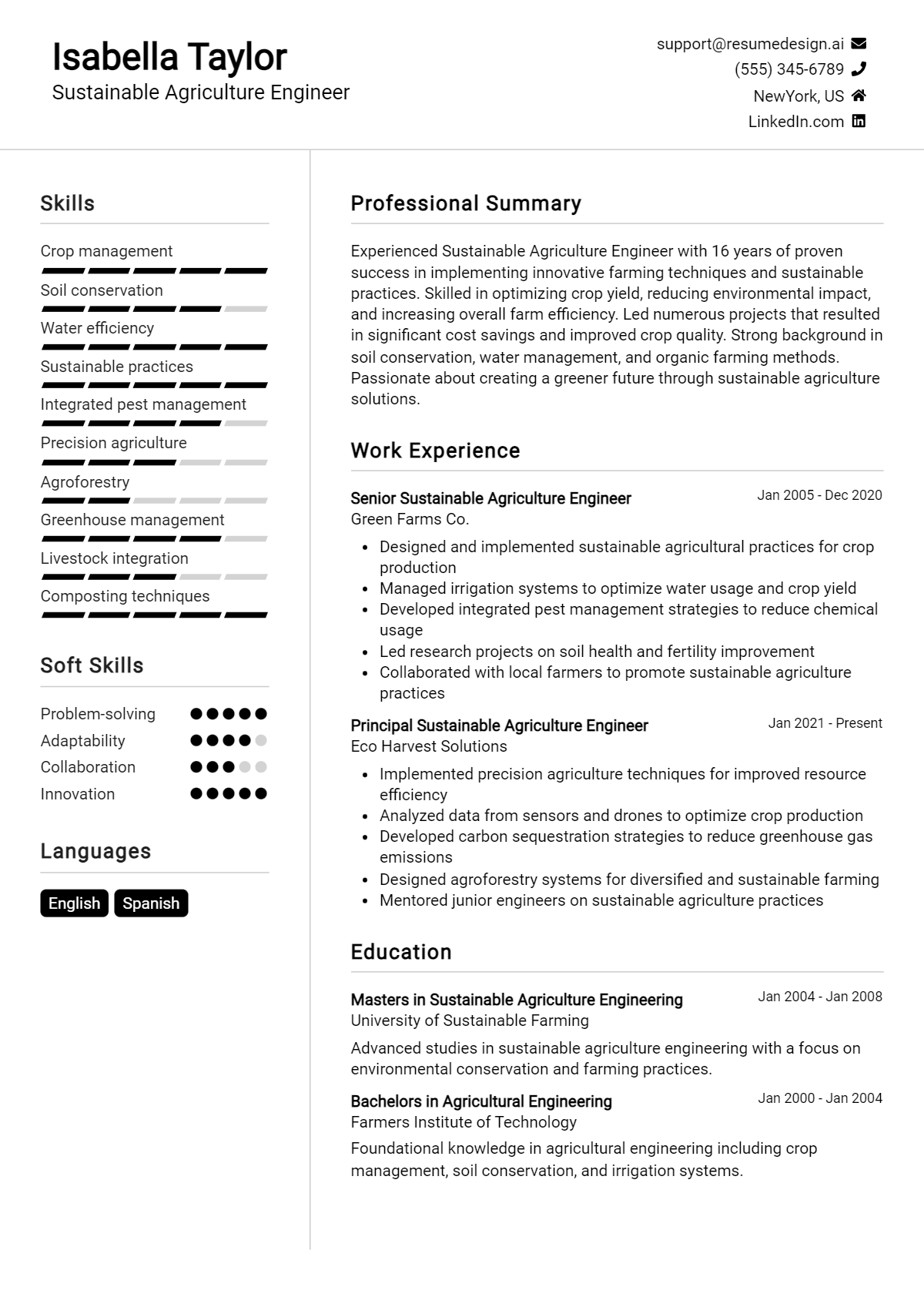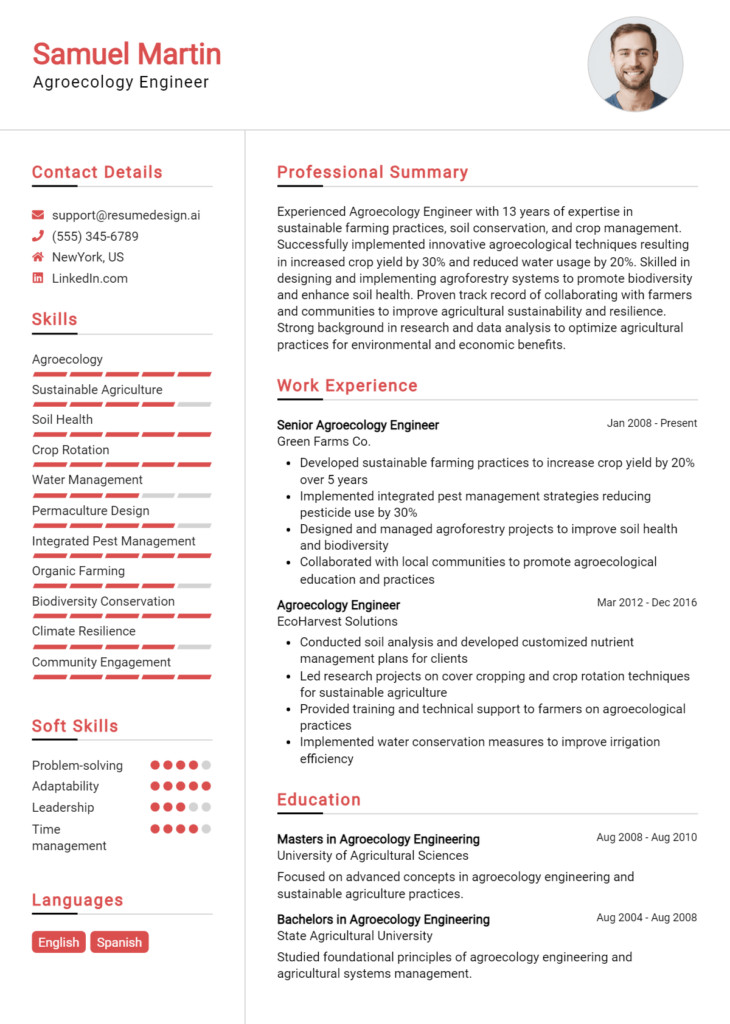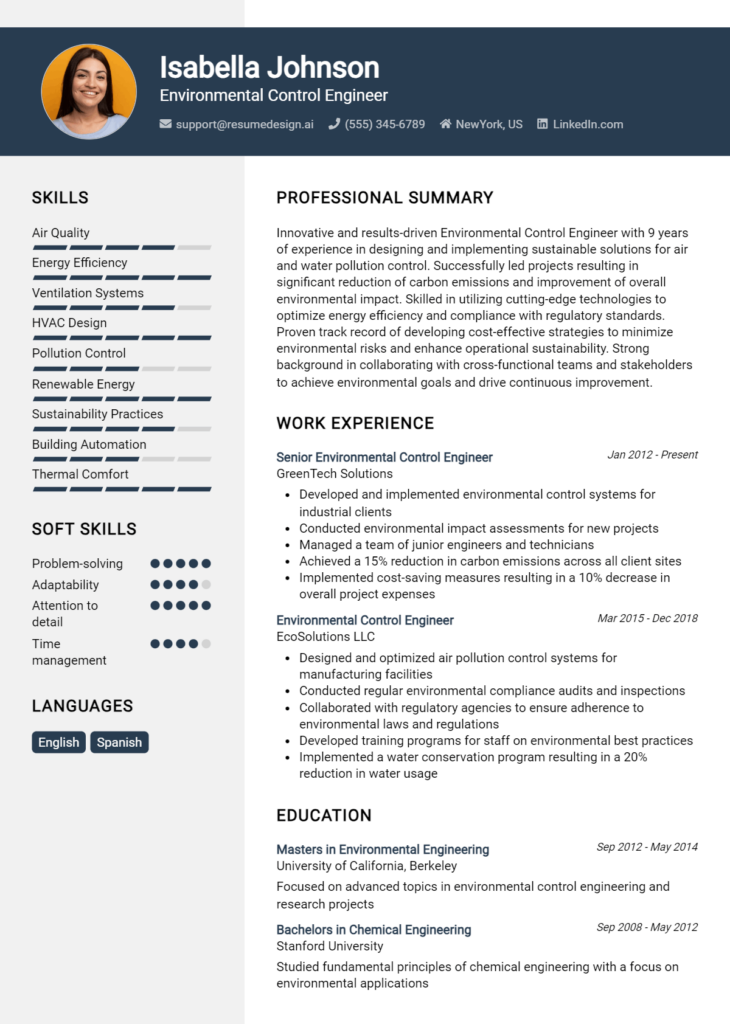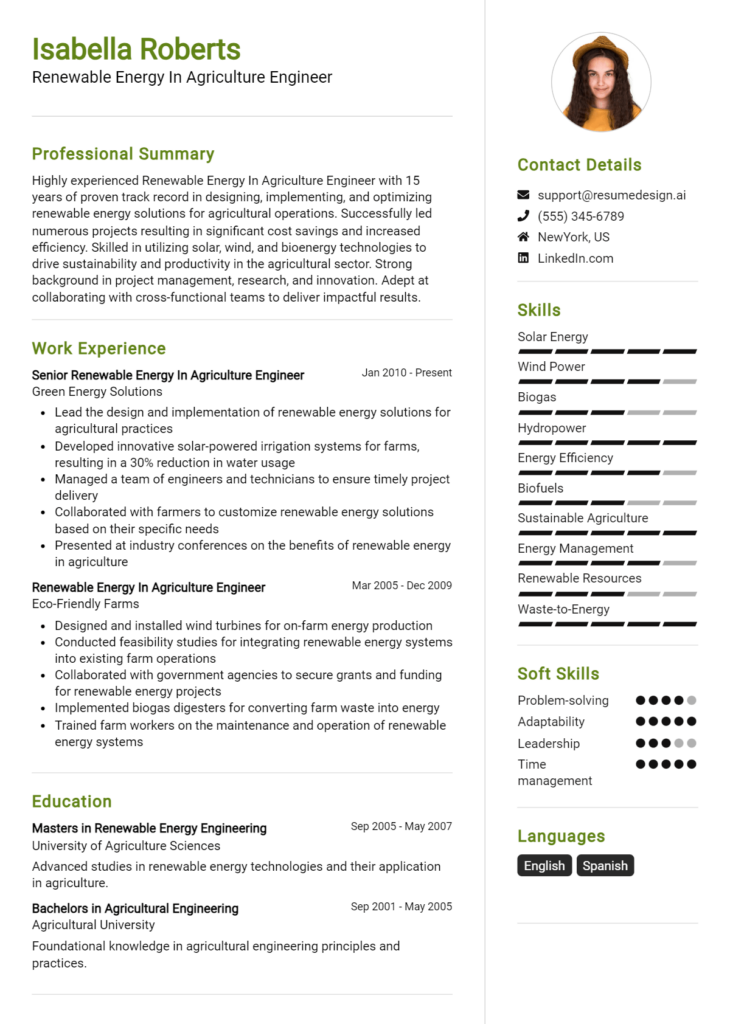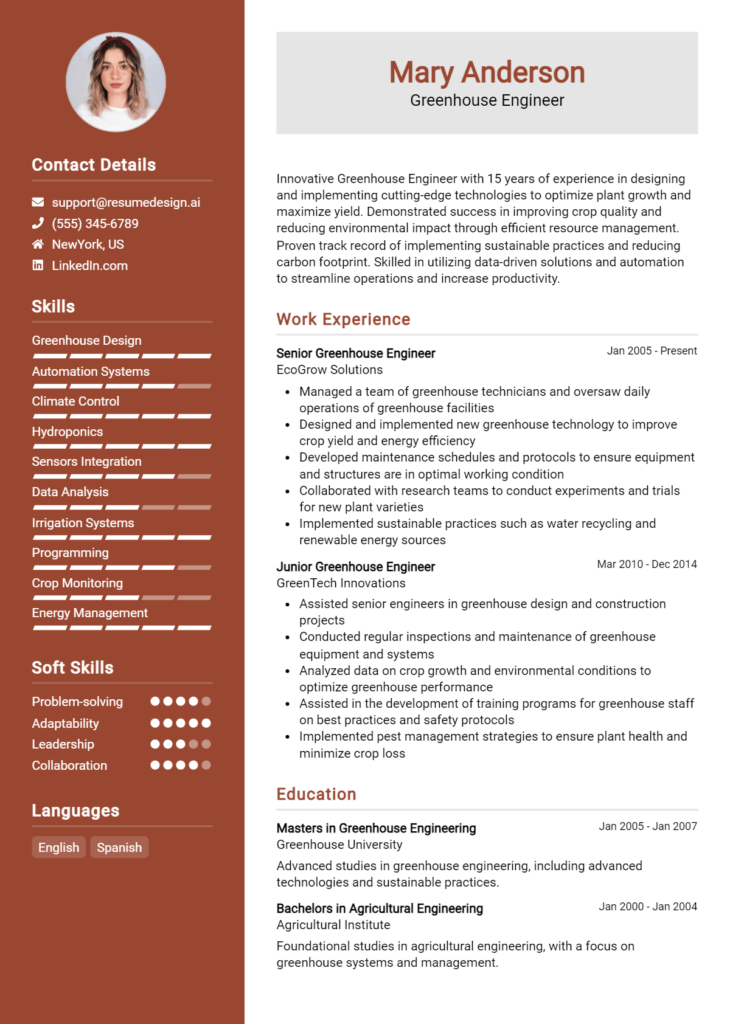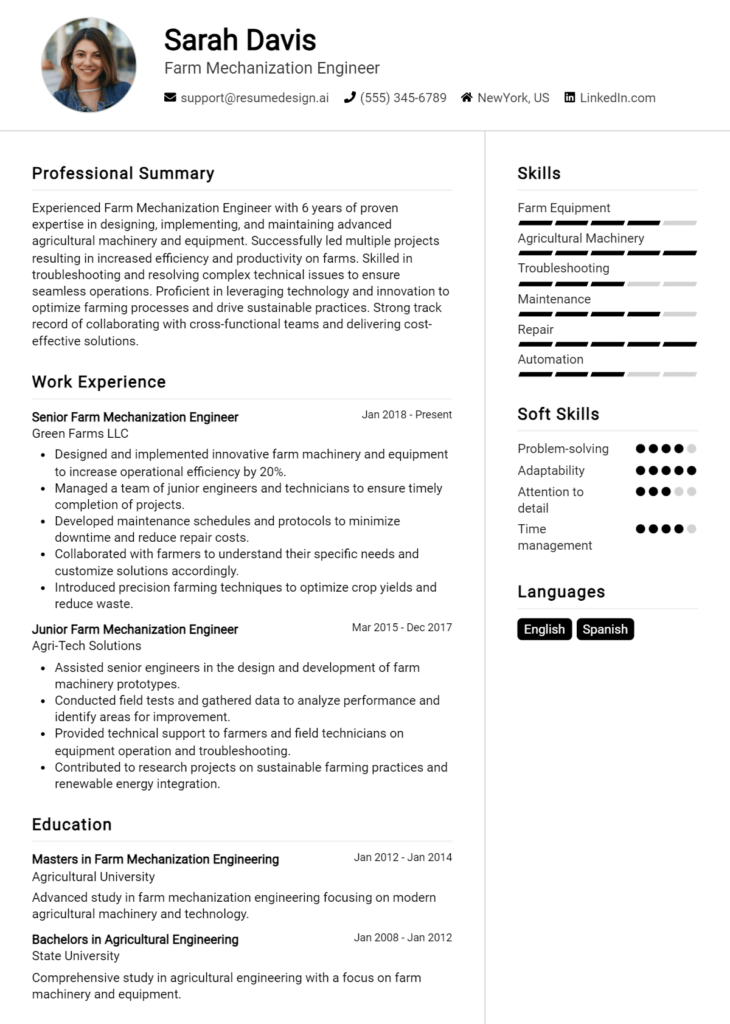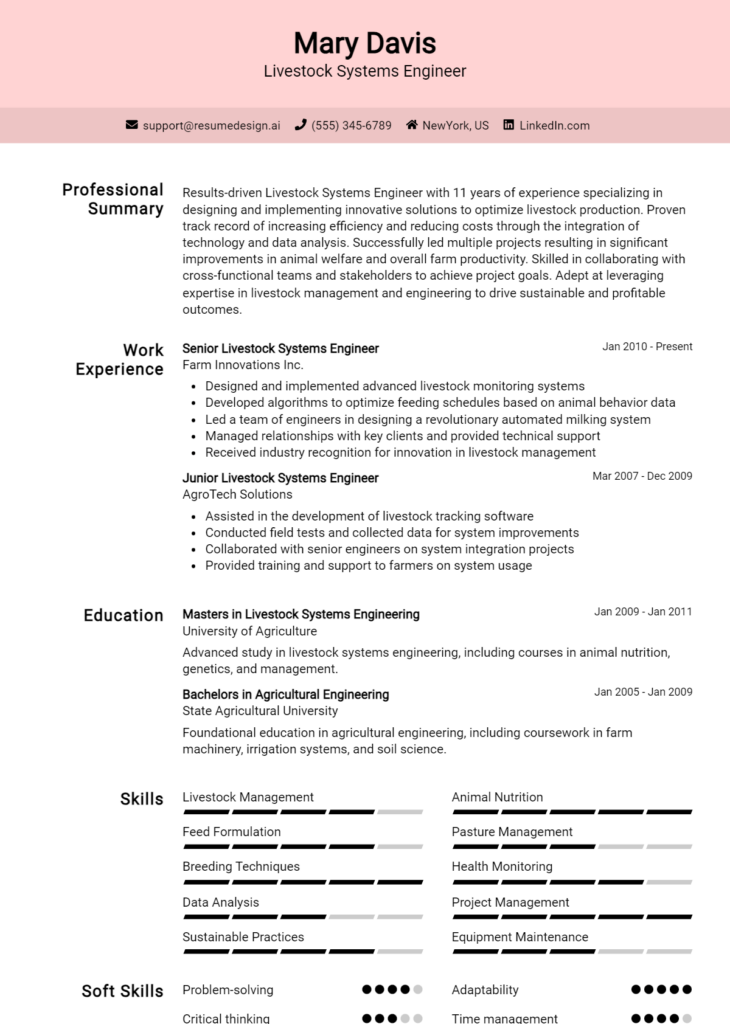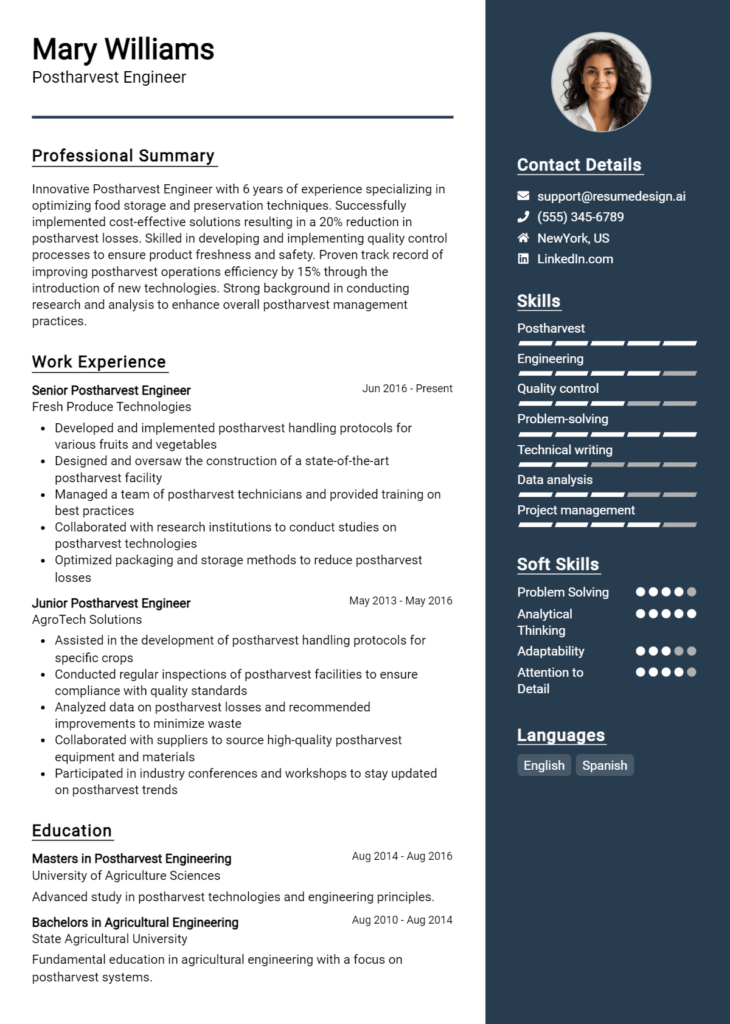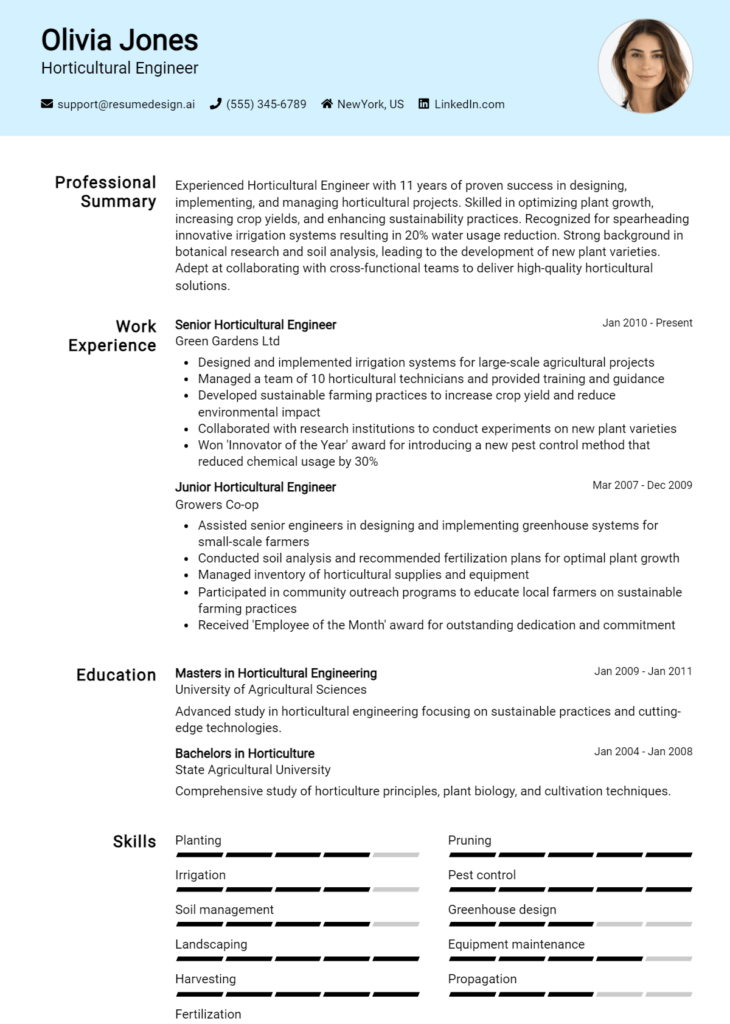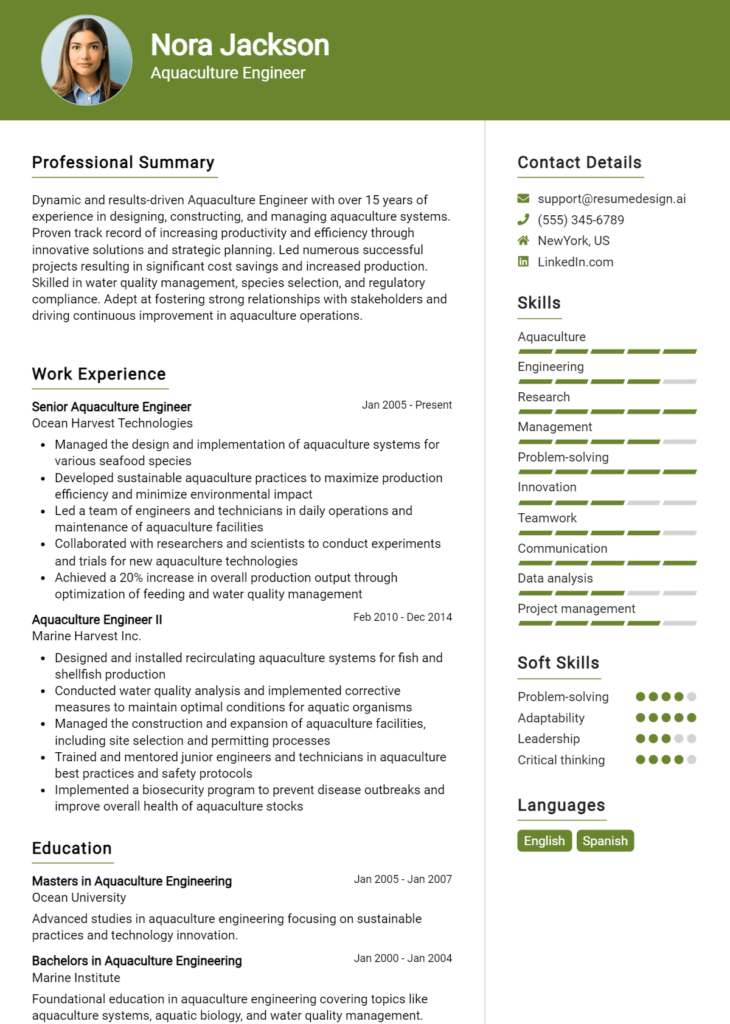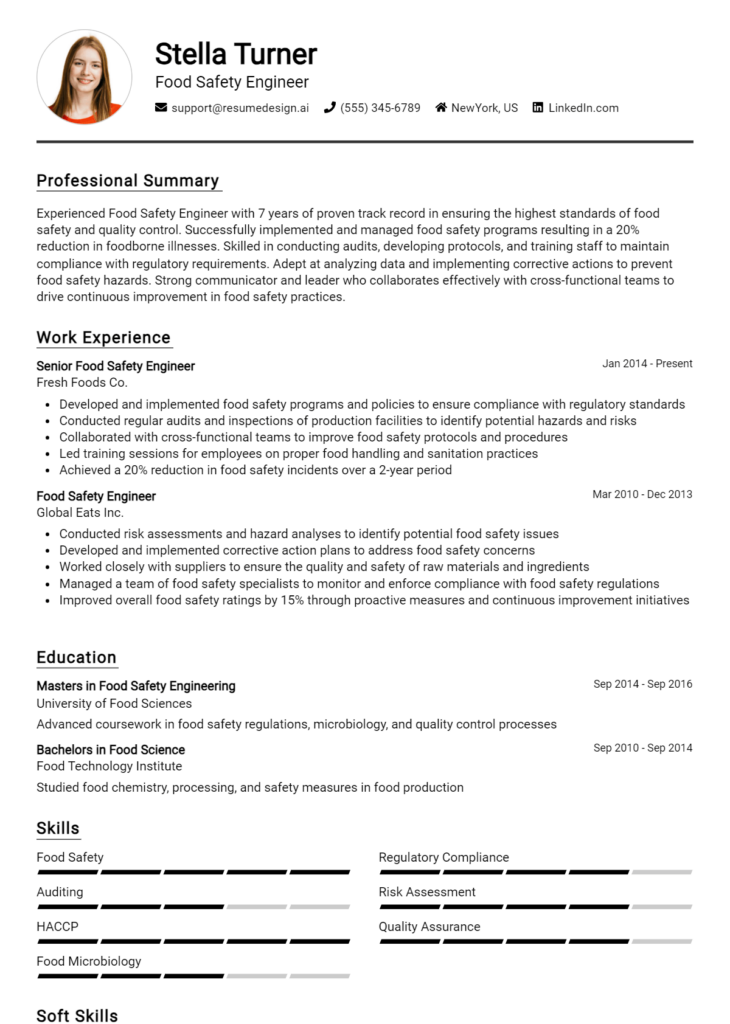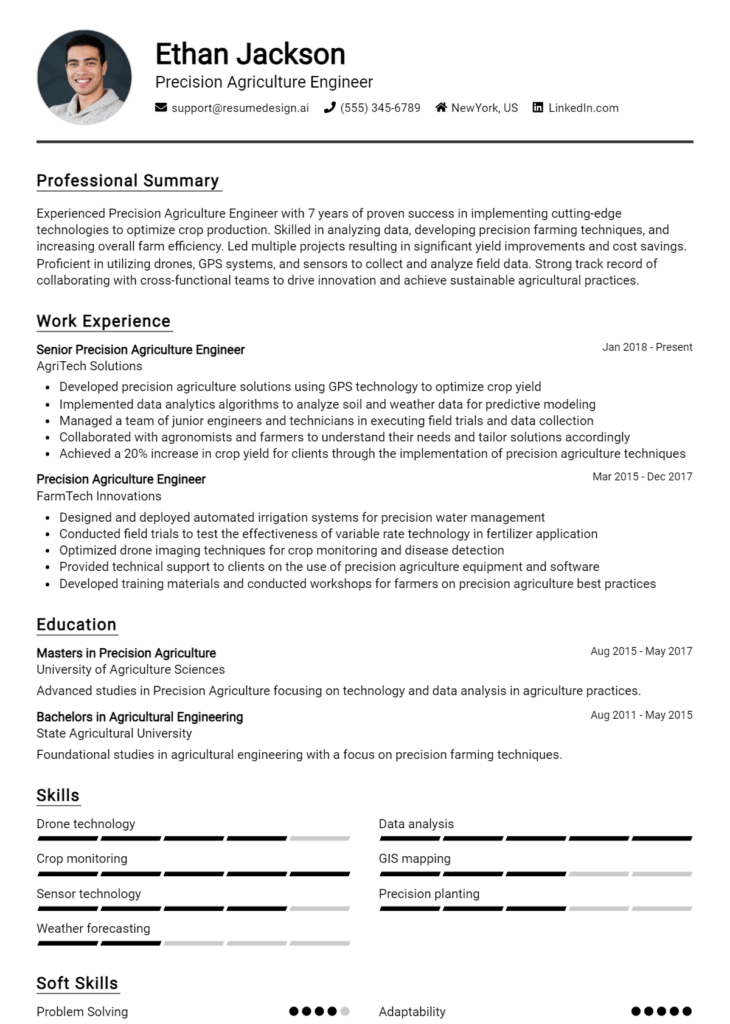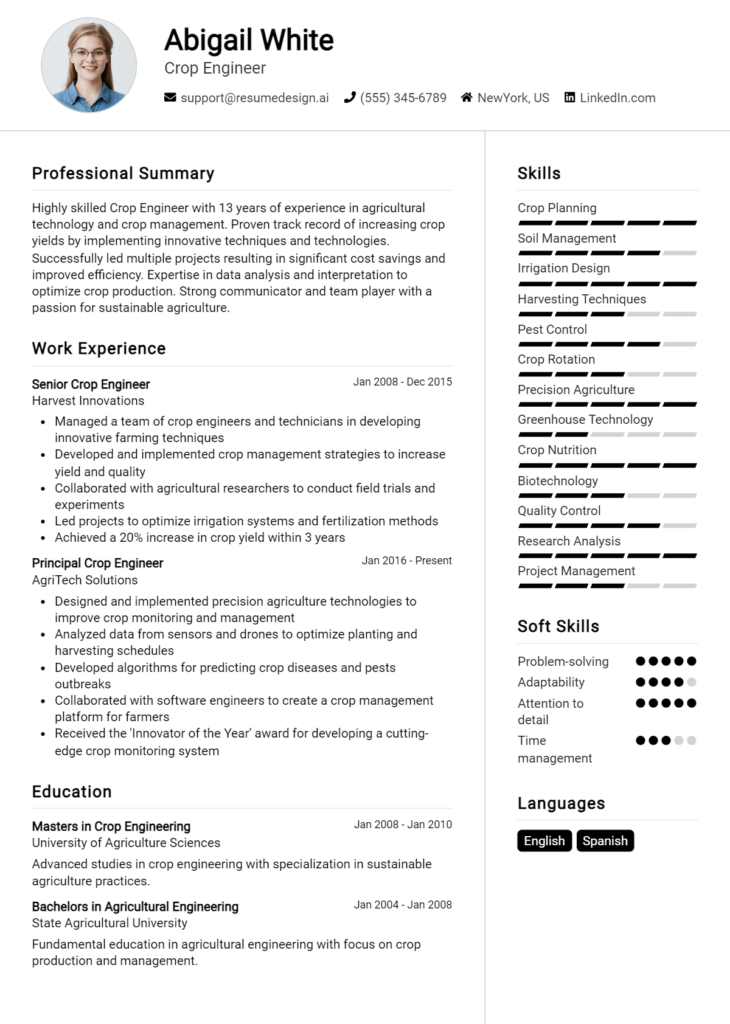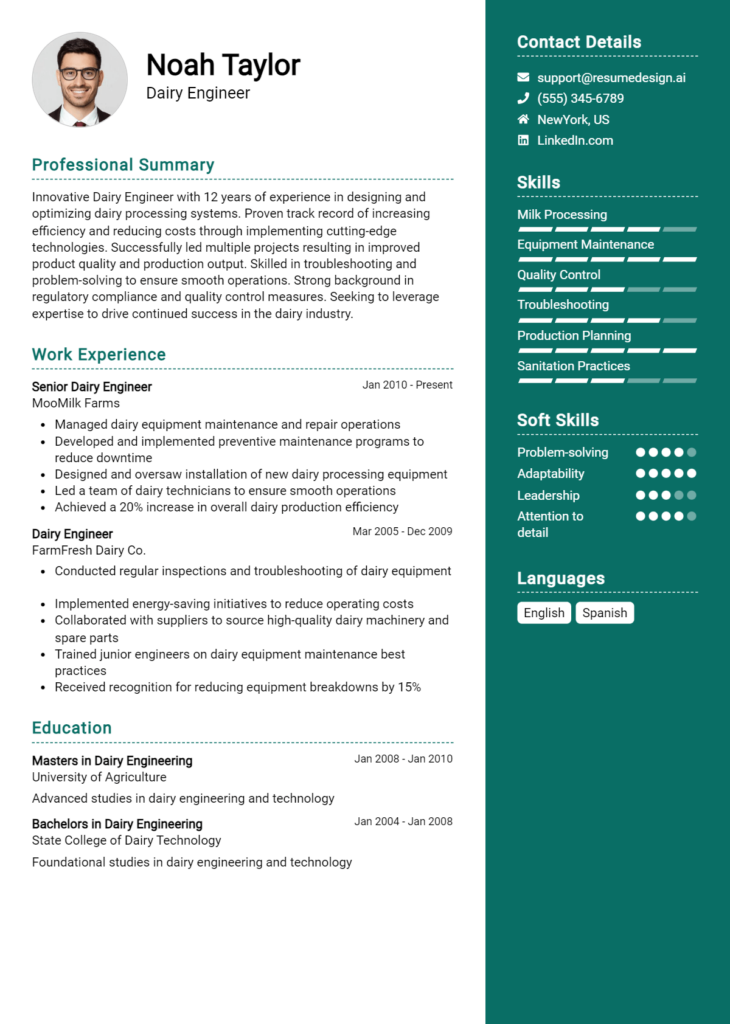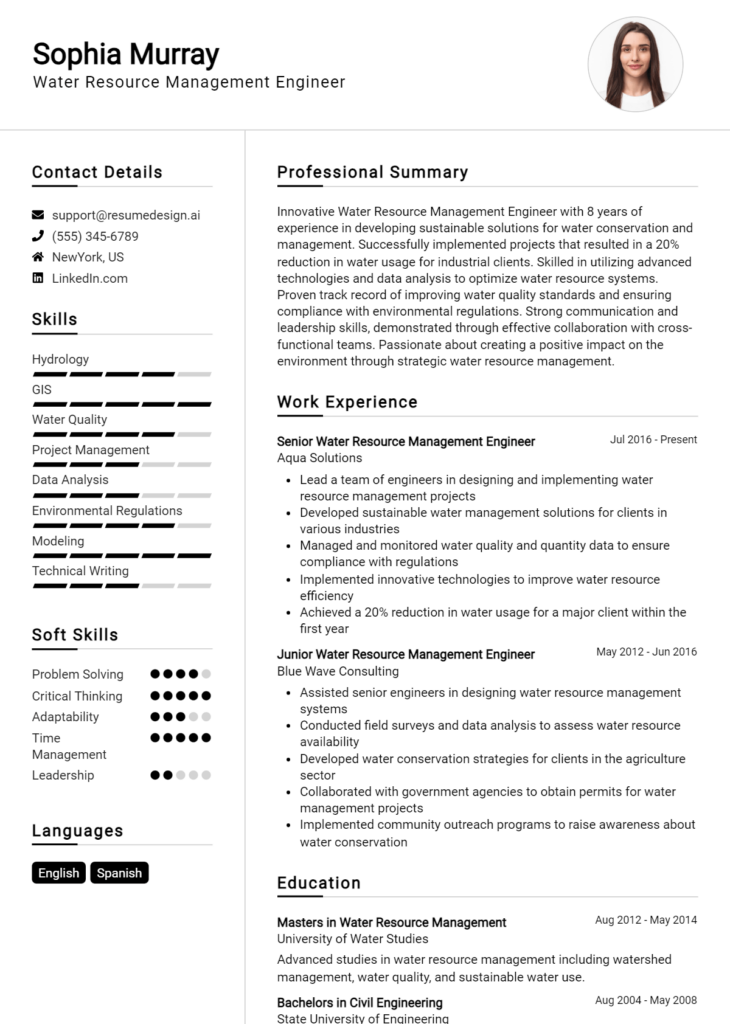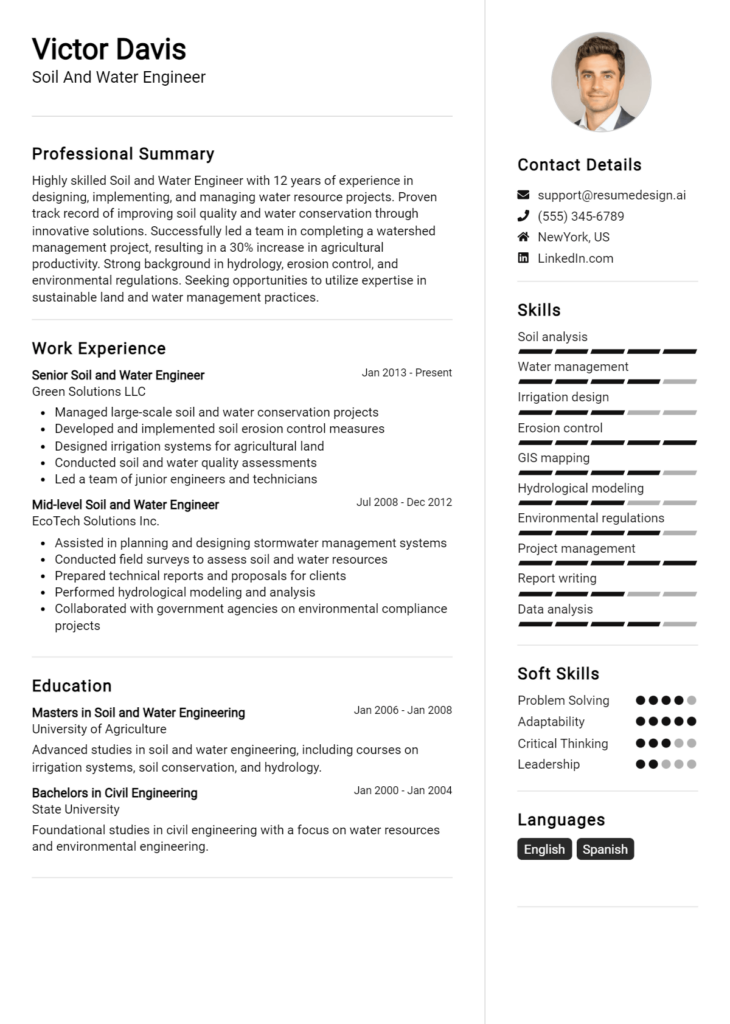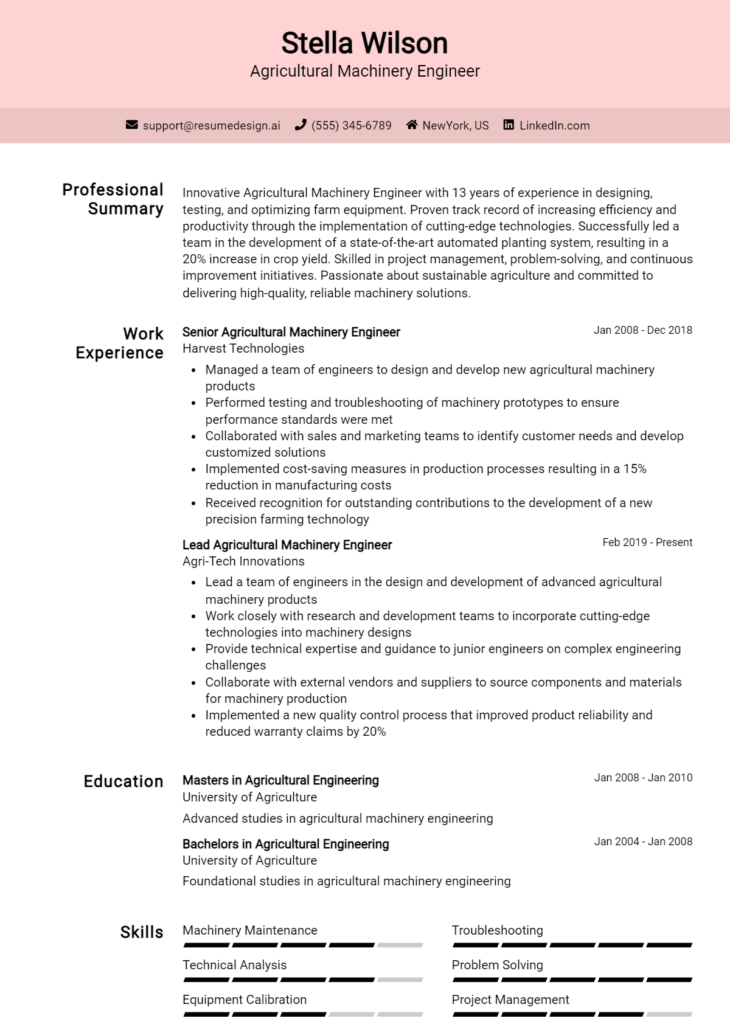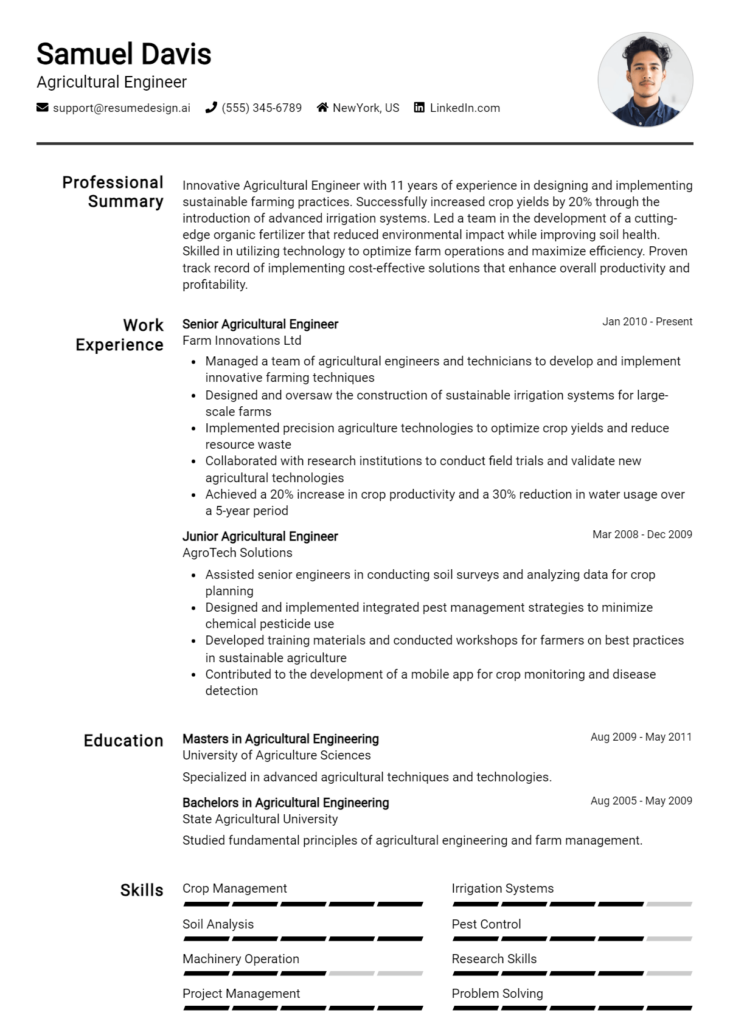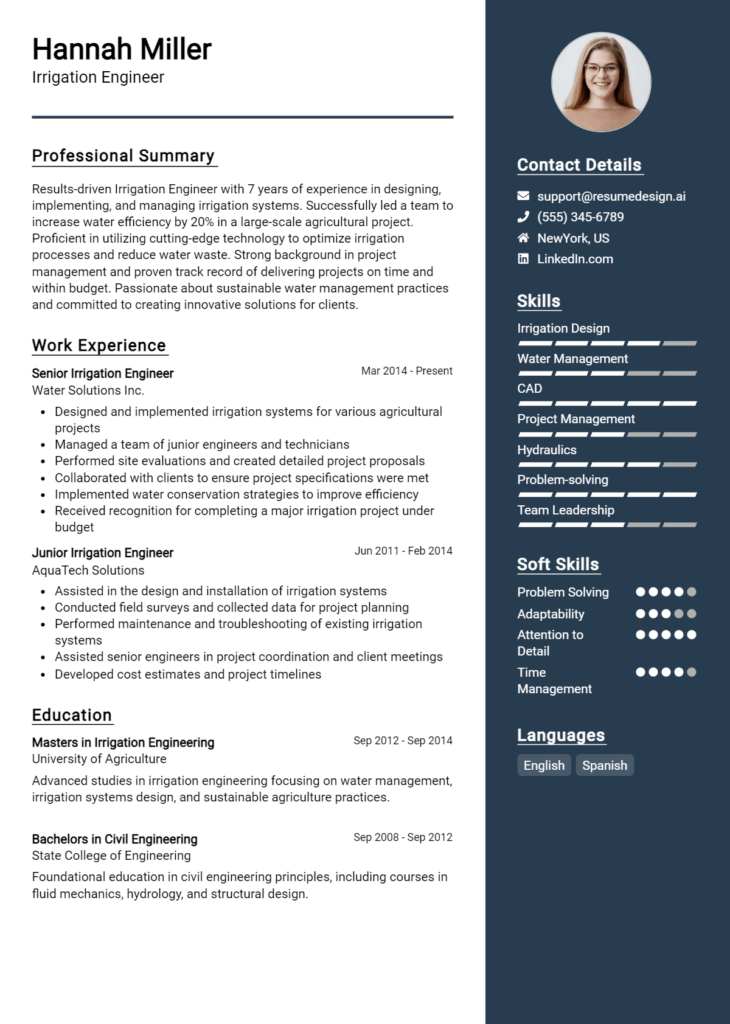Sustainable Agriculture Engineer Core Responsibilities
A Sustainable Agriculture Engineer plays a crucial role in designing and implementing environmentally friendly farming practices, bridging the gap between agricultural science, engineering, and environmental sustainability. Key responsibilities include conducting research, developing innovative farming technologies, and advising on soil and water conservation methods. Success in this role requires strong technical skills, operational expertise, and problem-solving abilities to address complex agricultural challenges. A well-structured resume that highlights these qualifications can effectively communicate the engineer’s contributions to the organization’s sustainability goals.
Common Responsibilities Listed on Sustainable Agriculture Engineer Resume
- Design and implement sustainable farming systems and practices.
- Conduct soil and water assessments to enhance agricultural productivity.
- Collaborate with farmers and agricultural stakeholders to optimize resource use.
- Develop and evaluate agricultural technologies for efficiency and sustainability.
- Analyze data to improve crop yields and reduce environmental impact.
- Research alternative pest management and organic farming solutions.
- Advise on regulatory compliance and environmental best practices.
- Prepare technical reports and presentations for stakeholders.
- Monitor project progress and implement necessary adjustments.
- Facilitate training workshops for farmers on sustainable techniques.
- Integrate renewable energy solutions into agricultural operations.
- Collaborate with interdisciplinary teams to promote sustainable initiatives.
High-Level Resume Tips for Sustainable Agriculture Engineer Professionals
In today's competitive job market, a well-crafted resume is essential for Sustainable Agriculture Engineer professionals aiming to make a strong first impression on potential employers. Your resume serves as a personal marketing tool, showcasing not only your skills and qualifications but also your achievements and the unique contributions you can bring to the field of sustainable agriculture. Given the complexity of this industry, it's crucial that your resume reflects your technical abilities, innovative thinking, and commitment to sustainability. This guide will offer practical and actionable resume tips specifically tailored for Sustainable Agriculture Engineer professionals, ensuring your application stands out in a crowded field.
Top Resume Tips for Sustainable Agriculture Engineer Professionals
- Tailor your resume to match the job description, emphasizing the specific skills and experiences that align with the employer's needs.
- Highlight relevant experience in sustainable agriculture, including internships, research projects, and any hands-on work you have undertaken.
- Quantify your achievements where possible, using metrics to demonstrate the impact of your work, such as yield increases or resource savings.
- Showcase industry-specific skills, such as knowledge of agricultural best practices, soil management, and environmental regulations.
- Include certifications and training that are relevant to sustainable agriculture, such as organic farming certifications or permaculture design courses.
- Utilize active language and strong action verbs to convey your contributions effectively and engage the reader.
- Incorporate keywords from the job posting to pass through applicant tracking systems (ATS) and catch the eye of hiring managers.
- Keep your resume concise and focused, ideally one page, ensuring that every word adds value to your application.
- Provide a brief summary at the top that outlines your career goals and what you bring to the table as a Sustainable Agriculture Engineer.
By implementing these tips, you can significantly increase your chances of landing a job in the Sustainable Agriculture Engineer field. A well-structured and tailored resume not only highlights your qualifications but also demonstrates your dedication to sustainable practices and your potential to contribute to innovative solutions in agriculture. Stand out from the competition and take the first step towards your dream role with a compelling resume.
Why Resume Headlines & Titles are Important for Sustainable Agriculture Engineer
In the competitive field of sustainable agriculture engineering, a resume headline or title plays a crucial role in capturing the attention of hiring managers. A strong headline serves as a powerful first impression, summarizing a candidate's key qualifications and expertise in a concise and impactful way. It helps the applicant stand out in a sea of resumes by clearly conveying their unique skills and experiences that align with the job being applied for. A well-crafted headline should be relevant to the position, succinctly encapsulating the candidate’s strengths and making a compelling case for why they are the ideal fit for the role.
Best Practices for Crafting Resume Headlines for Sustainable Agriculture Engineer
- Keep it concise and to the point, ideally under 10 words.
- Make it role-specific, focusing on sustainable agriculture engineering.
- Highlight key qualifications or skills that are relevant to the position.
- Use action-oriented language to convey strength and confidence.
- Incorporate relevant industry keywords to enhance visibility.
- Avoid jargon or overly complex terms that may confuse the reader.
- Ensure it reflects your unique selling proposition as a candidate.
- Tailor the headline for each job application to align with specific requirements.
Example Resume Headlines for Sustainable Agriculture Engineer
Strong Resume Headlines
Innovative Sustainable Agriculture Engineer with 5+ Years in Precision Farming
Expert in Eco-Friendly Soil Management and Sustainable Crop Solutions
Award-Winning Engineer Specializing in Renewable Agricultural Technologies
Sustainable Agriculture Specialist with Proven Success in Reducing Water Usage
Weak Resume Headlines
Engineer Looking for a Job
Professional with Experience in Agriculture
The strong headlines are effective because they are specific, impactful, and immediately convey the candidate's relevant skills and experiences, making a strong impression on hiring managers. They highlight unique qualifications that align with the role, enhancing the likelihood of capturing interest. In contrast, the weak headlines fail to impress due to their vagueness and lack of detail, leaving hiring managers without a clear understanding of the candidate's strengths or how they might fit into the organization. A compelling headline should draw the reader in, encouraging them to explore the candidate's qualifications further.
Writing an Exceptional Sustainable Agriculture Engineer Resume Summary
A well-crafted resume summary is crucial for a Sustainable Agriculture Engineer as it serves as the first impression a hiring manager has of a candidate. This brief yet impactful section captures key skills, relevant experiences, and noteworthy accomplishments that align with the job requirements. A strong summary not only highlights the candidate’s qualifications but also showcases their passion for sustainable practices and innovations in agriculture, making it easier for hiring managers to quickly assess their suitability for the role. It should be concise, engaging, and tailored specifically to the job the candidate is applying for, ensuring maximum impact in a competitive job market.
Best Practices for Writing a Sustainable Agriculture Engineer Resume Summary
- Quantify Achievements: Use numbers to demonstrate the impact of your work, such as percentage improvements in crop yields or reductions in resource usage.
- Focus on Relevant Skills: Highlight specific skills that are essential for the role, such as knowledge of sustainable farming techniques, soil management, and data analysis.
- Tailor to Job Description: Customize your summary to reflect the keywords and requirements listed in the job description, ensuring alignment with the employer's needs.
- Be Concise: Keep the summary brief, ideally 3-5 sentences, to ensure clarity and maintain the reader’s attention.
- Showcase Industry Knowledge: Mention any relevant certifications, technologies, or methodologies that demonstrate your expertise in sustainable agriculture.
- Emphasize Problem-Solving: Highlight your ability to address challenges in agriculture sustainably, showcasing innovation and critical thinking.
- Use Strong Action Verbs: Start sentences with powerful verbs to convey confidence and a proactive approach.
- Include Soft Skills: Incorporate soft skills such as teamwork, communication, and leadership that are essential in collaborative agricultural projects.
Example Sustainable Agriculture Engineer Resume Summaries
Strong Resume Summaries
Dynamic Sustainable Agriculture Engineer with over 7 years of experience improving crop yields by 30% through innovative soil management techniques and precision irrigation systems. Proven track record in implementing sustainable practices that reduced water consumption by 25% while enhancing soil health.
Results-driven engineer skilled in developing integrated pest management systems, leading to a 40% reduction in pesticide use and a 15% increase in biodiversity on farms. Dedicated to advancing sustainable agriculture through research and collaboration with local farmers.
Passionate about sustainable farming, with expertise in renewable energy applications within agriculture, achieving a 20% decrease in operational costs for various farming operations. Certified in organic farming practices and proficient in agricultural data analysis.
Weak Resume Summaries
Experienced engineer with some knowledge of sustainable agriculture. Looking for opportunities to work in the field.
I have worked in agriculture for a few years and am interested in sustainability. I am a team player.
The examples provided illustrate the differences between strong and weak resume summaries. Strong summaries are specific, quantifiable, and directly relevant to the role, showcasing the candidate's expertise and achievements. They effectively communicate the candidate's qualifications and impact in a concise manner. In contrast, weak summaries lack detail, provide no measurable outcomes, and come across as generic, failing to capture the attention of hiring managers or demonstrate the candidate's true potential.
Work Experience Section for Sustainable Agriculture Engineer Resume
The work experience section of a Sustainable Agriculture Engineer resume is crucial for demonstrating the candidate's technical skills and their ability to manage teams effectively while delivering high-quality results. This section not only highlights relevant past roles but also showcases accomplishments that align with industry standards. By quantifying achievements, candidates can provide concrete evidence of their contributions to sustainable practices and innovations, making their resumes stand out to potential employers.
Best Practices for Sustainable Agriculture Engineer Work Experience
- Highlight specific technical skills relevant to sustainable agriculture, such as soil management, crop rotation, or irrigation systems.
- Quantify achievements with metrics, such as percentage improvements in crop yields or reductions in water usage.
- Emphasize leadership roles in team projects to demonstrate management capabilities.
- Showcase collaborative efforts with interdisciplinary teams to highlight communication and teamwork skills.
- Align experience descriptions with current industry standards and practices to enhance relevance.
- Include certifications or training that bolster technical expertise in sustainable agriculture.
- Use action verbs to start bullet points, making accomplishments sound impactful and dynamic.
- Tailor the experience section to reflect the specific requirements of the job being applied for.
Example Work Experiences for Sustainable Agriculture Engineer
Strong Experiences
- Led a cross-functional team that implemented a precision agriculture system, resulting in a 30% increase in crop yields and a 20% reduction in water usage over two growing seasons.
- Designed and executed a sustainable irrigation project that decreased operational costs by 15% while enhancing water conservation practices on a 500-acre farm.
- Collaborated with local farmers to transition to organic farming methods, achieving a 25% increase in overall soil health and a 40% rise in marketable produce within the first year.
Weak Experiences
- Worked on various projects related to agriculture.
- Assisted with the implementation of some farming techniques.
- Participated in team meetings about sustainability.
The examples labeled as "strong" demonstrate clear quantifiable outcomes and effective leadership in technical projects, showcasing the candidate's ability to impact sustainable agriculture positively. In contrast, the "weak" experiences lack specific details and metrics, making them less compelling and failing to illustrate the candidate's true capabilities or contributions to the field.
Education and Certifications Section for Sustainable Agriculture Engineer Resume
The education and certifications section of a Sustainable Agriculture Engineer resume plays a crucial role in establishing the candidate's qualifications and expertise in the field. This section not only showcases the academic background that has prepared the candidate for the challenges of sustainable agriculture but also highlights any industry-relevant certifications and ongoing learning endeavors. By including relevant coursework, certifications, and specialized training, candidates can significantly enhance their credibility and demonstrate their alignment with the specific demands of the job role, which is vital in an ever-evolving field focused on sustainability and innovation.
Best Practices for Sustainable Agriculture Engineer Education and Certifications
- Include degrees in Agronomy, Environmental Science, or related fields to demonstrate foundational knowledge.
- Highlight industry-recognized certifications such as Certified Crop Advisor (CCA) or Certified Sustainable Agricultural Practitioner (CSAP).
- Provide details of relevant coursework that emphasizes sustainable practices, soil management, and ecological engineering.
- List any continuing education courses or workshops that showcase commitment to staying updated on industry trends.
- Emphasize any specialized training programs related to sustainable technologies, precision agriculture, or environmental policy.
- Use clear formatting to make the section easy to read and navigate, ensuring that key qualifications stand out.
- Tailor the content to align with the job description, highlighting the most pertinent qualifications first.
- Include any memberships in professional organizations that reflect dedication to the field of sustainable agriculture.
Example Education and Certifications for Sustainable Agriculture Engineer
Strong Examples
- B.S. in Agricultural Engineering, University of California, Davis, 2020
- Certified Crop Advisor (CCA) from the American Society of Agronomy, 2021
- Completed coursework in Sustainable Soil Management and Agroecology
- Advanced Training in Precision Agriculture Technologies, 2022
Weak Examples
- B.A. in History, University of Texas, 2018
- Certification in Basic Gardening Techniques, 2019
- Completed an online course in Creative Writing, 2020
- High School Diploma, 2015
The strong examples listed above are considered relevant because they directly relate to the responsibilities and knowledge required for a Sustainable Agriculture Engineer role, showcasing both educational background and professional certifications that emphasize a commitment to sustainable practices. In contrast, the weak examples reflect qualifications that are either outdated, not directly applicable to the field, or lack relevance to the core competencies needed in sustainable agriculture engineering, thus failing to enhance the candidate's profile in a competitive job market.
Top Skills & Keywords for Sustainable Agriculture Engineer Resume
As the demand for sustainable farming practices continues to grow, the role of a Sustainable Agriculture Engineer has become increasingly vital. A well-crafted resume is essential for showcasing the unique skills that an engineer in this field must possess. Highlighting both hard and soft skills is crucial, as they demonstrate a candidate's technical expertise as well as their ability to work collaboratively and communicate effectively within diverse teams. The right combination of skills not only enhances your employability but also underscores your commitment to advancing sustainable agricultural practices.
Top Hard & Soft Skills for Sustainable Agriculture Engineer
Soft Skills
- Strong communication skills
- Problem-solving abilities
- Team collaboration
- Adaptability and flexibility
- Critical thinking
- Project management
- Creativity and innovation
- Conflict resolution
- Time management
- Attention to detail
- Leadership qualities
- Empathy and cultural awareness
- Networking and relationship-building
- Decision-making
Hard Skills
- Knowledge of sustainable farming techniques
- Proficiency in environmental impact assessment
- Expertise in soil science and agronomy
- Familiarity with irrigation systems design
- Experience with renewable energy applications in agriculture
- Understanding of agricultural machinery and technology
- GIS and remote sensing proficiency
- Data analysis and statistical software skills
- Knowledge of pest management strategies
- Proficient in regulatory compliance and environmental laws
- Familiarity with crop modeling software
- Understanding of organic farming practices
- Ability to conduct research and development in agricultural technologies
- Experience in farm management systems
Incorporating these skills into your resume can significantly enhance your chances of landing a role in this crucial field. Additionally, showcasing relevant work experience will further strengthen your application by providing tangible evidence of your capabilities.
Stand Out with a Winning Sustainable Agriculture Engineer Cover Letter
Dear [Hiring Manager's Name],
I am writing to express my interest in the Sustainable Agriculture Engineer position at [Company Name], as advertised on [Where You Found the Job Posting]. With a solid educational background in agricultural engineering and hands-on experience in sustainable farming practices, I am excited about the opportunity to contribute to innovative solutions that promote environmental stewardship and resource efficiency in agriculture. My passion for sustainable practices, combined with my technical expertise, makes me an ideal candidate for this role.
During my previous role at [Previous Company Name], I successfully led a project that implemented precision agriculture technologies to optimize water usage and reduce chemical inputs. This initiative not only improved crop yields by 20% but also significantly minimized the environmental impact of farming operations. My proficiency in data analysis and modeling, paired with a deep understanding of soil and crop science, allows me to develop strategies that align with both agricultural productivity and sustainability goals. I am particularly drawn to [Company Name]’s commitment to innovation and sustainability, and I am eager to bring my experience in developing eco-friendly agricultural practices to your team.
I am also dedicated to collaborating with multidisciplinary teams, including agronomists, environmental scientists, and policy makers, to create comprehensive solutions that address the challenges of modern agriculture. My ability to communicate complex ideas clearly and effectively has been instrumental in fostering partnerships and driving projects forward. I am excited about the possibility of working with [Company Name] to enhance sustainable agricultural systems that not only benefit farmers but also safeguard our natural resources for future generations.
Thank you for considering my application. I look forward to the opportunity to discuss how my background, skills, and enthusiasm for sustainable agriculture can contribute to the innovative work being done at [Company Name]. I am eager to bring my experience in engineering sustainable practices to your esteemed organization and help advance its mission.
Sincerely,
[Your Name]
[Your Contact Information]
Common Mistakes to Avoid in a Sustainable Agriculture Engineer Resume
When crafting a resume for a Sustainable Agriculture Engineer position, it's essential to highlight relevant skills and experiences that demonstrate your expertise in sustainable practices and technologies. However, many candidates make common mistakes that can undermine their chances of standing out to potential employers. By avoiding these pitfalls, you can create a compelling resume that effectively showcases your qualifications and aligns with the needs of the industry.
Lack of Specificity: Using vague terms or general phrases can dilute the impact of your qualifications. Instead, be specific about your achievements, projects, and the technologies you have worked with.
Ignoring Keywords: Many companies use Applicant Tracking Systems (ATS) to screen resumes. Failing to include relevant keywords from the job description can result in your resume being overlooked.
Overloading with Jargon: While industry-specific terminology can demonstrate expertise, overusing jargon can make your resume difficult to read. Aim for clarity and balance technical language with accessibility.
Neglecting Soft Skills: Sustainable agriculture relies on collaboration and communication. Focusing solely on technical skills without mentioning soft skills can give an incomplete picture of your capabilities.
Inadequate Education and Certifications Section: Given the specialized nature of sustainable agriculture, it’s important to clearly list your educational background and any relevant certifications. Omitting these can lead to missed opportunities.
Poor Formatting: A cluttered or unprofessional layout can distract from your qualifications. Ensure your resume is well-organized, easy to read, and visually appealing to make a strong impression.
Failure to Tailor the Resume: Sending out a generic resume for multiple positions can weaken your application. Tailor your resume for each job by highlighting the most relevant experiences and accomplishments that match the specific role.
Not Including Quantifiable Achievements: Simply stating your responsibilities at previous jobs is not enough. Use numbers and data to showcase your impact, such as improvements in yield, reductions in resource use, or successful project completions.
Conclusion
As we conclude our exploration of the Sustainable Agriculture Engineer role, it's essential to emphasize the vital contributions these professionals make towards promoting eco-friendly practices, enhancing agricultural productivity, and ensuring food security. The key responsibilities of a Sustainable Agriculture Engineer include designing sustainable farming systems, developing innovative technologies for efficient resource use, and collaborating with farmers and agricultural organizations to implement these solutions.
In addition to technical expertise, effective communication and project management skills are crucial for success in this field. Staying updated with the latest agricultural trends, sustainability practices, and regulatory requirements is also paramount.
Now that you have a clearer understanding of the Sustainable Agriculture Engineer role, it’s time to take action. Review your resume to ensure it highlights your relevant skills and experiences effectively. To assist you in this process, consider utilizing helpful resources such as resume templates, a resume builder, resume examples, and cover letter templates. These tools can enhance your application and help you stand out in the competitive job market. Don’t miss the opportunity to showcase your qualifications and passion for sustainable agriculture!

